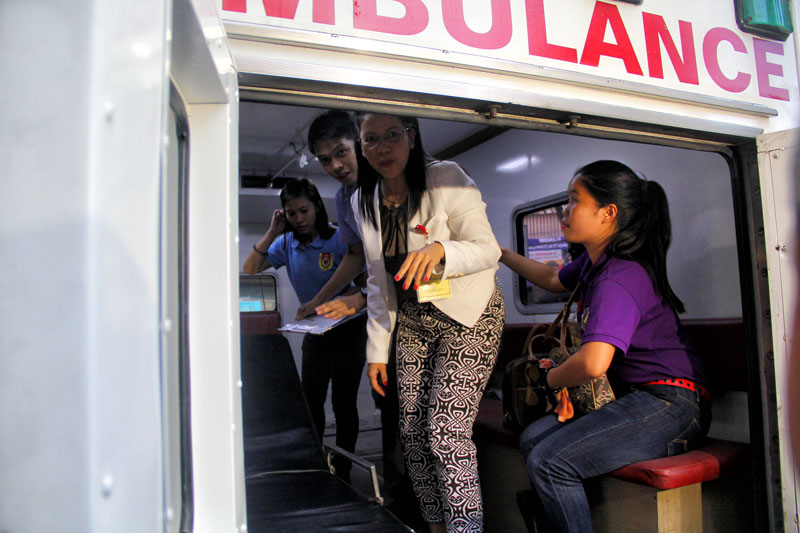First District election supervisor Aimee Ampoloquio was then asking a teacher who served as Board of Election Inspectors (BEI) chair from the Catalunan Grande National High School about how the transmission of the ERs was conducted because the ERs were not reflected in the Canvassing and Consolidation System (CSS) laptop stationed at the SP session hall.
By CHERYLL D. FIEL
Davao Today
DAVAO CITY, Philippines —Canvassing of the votes from Davao City snagged on Tuesday when the chair of the City Board of Canvassers (CBOC) suffered from high blood pressure and was escorted out to an ambulance.
First District election supervisor Aimee Ampoloquio, who served as CBOC chair, was asking teachers who served as board of election inspectors (BEIs) about how they failed in transmitting the election returns (ERs), when suddenly she turned her swiveled chair from the teacher and had someone checked her blood pressure.
A colleague helped her remove her blazer and another gave her a glass of water. This stalled the canvassing for about 30 minutes.
“I am not usually hypertensive. Maybe I am just excited about the results,” she said upon facing the hall again.
But two hours later, after hearing more reports about problems in the transmission of ERs, she declared the canvassing suspended as she was not feeling well and had to see a doctor. She was immediately ushered to a waiting ambulance outside the Sangguniang Panlungsod.
As of Tuesday afternoon, 92 percent of the 1,162 clustered precincts have been counted. The Comelec has yet to receive results from the remaining eight percent of the clustered precincts that bogged down due to transmission problems.
Same problems like 2010
Teachers and election officers noted the same problems in canvassing as it happened in 2010.
An election officer of the City’s second legislative district reported to the CBOC that defective memory cards are noted in clustered precinct 808 in Barangay Tibungco. There were also instances of non-printing of ERs and non-transmittal of ballots after counting. BEIs who encountered malfunctioned PCOS machines had to wait for another machine to be used.
Some BEIs who met these problems opted to hand carry the ballots to the CBOC. There are also cases such in Clustered Precinct 292 of Catalunan Grande National High School where PCOS machines reflected successful transmission, but the results however, are not reflected yet in the Consolidation and Canvassing System (CCS) laptop at the CBOC.
In such cases, the BEI had to request the Chair of the CBOC to allow them to retrieve the I-button and the compact clash card (CF card) that have already been surrendered to the Comelec so that they can either try transmitting through another PCOS machine, or if not, take the option as suggested by the CBOC to manually upload the content of the CF card to the CCS laptop.
Comelec District 3 officer Danilo Cullo also reported to the CBOC as of Tuesday afternoon that they have not received anything yet from the 11 clustered precincts in Marilog District and were still awaiting report of the status of transmission.
The Comelec as of Tuesday is still awaiting results from 91 voting precincts from 60 villages which had yet to transmit results to the CBOC. This, explained Ampoloquio, is the reason why Comelec could not give partial official results yet.
The media was confined in the SP session hall’s mezzanine room, where the audio is bad and the projection screen is far away. What the media was able to get from the canvassing room was monitoring progress of votes being transmitter. But the number of votes can hardly be seen from the mezzanine.
The media had to rely on news websites showing unofficial election results electronically sources from the Comelec’s server.
Davao City has 1,162 clustered precincts with each having an average of 800-1,000 registered voters.
While the Davao City Comelec has yet to come out with an official declaration of the total voter turnout, many of the clustered precincts usually rendered a turnout percentage of 45 to a little over 50 percent at the end of the voting day.
Cause of high-blood pressure
The repeated problems may have caused CBOC chair Ampoloquio’s blood pressure to shoot up.
Ampoloquio was then asking the BEI chair from the Catalunan Grande National High School about how the transmission of the ERs was conducted because the ERs were not reflected in the Canvassing and Consolidation System (CSS) laptop stationed at the SP session hall.
Asked whether she did a “manual or automatic” transmission, the teacher could not answer and instead told the election officer that they tried to transmit the results many times.
The teacher further explained that even after the PCOS flashed the sign that ERs have been successfully transmitted, the “retry sign” showed up again in the machine counter so that they had to press it.
“Ah so you were doing the automatic,” Ampoloquio told the teacher. But the teacher went on to say that they waited for many hours for transmission to be completed, and in fact said they were finished by 10:45 PM when it should have already been done by 9 PM.
Ampoloquio pressed on with her questions, as if lecturing the BEI when afterwards she paused and had her blood pressure checked.
Ampoloquio recently took a lashing from teachers’ groups when she remarked that teachers serving as BEIs who experienced difficulties in the final testing and sealing of the PCOS machines are “either forgetful or they are stupid.”
Teachers took it a slur against their ranks and demanded a public apology which Ampoloquio just shrugged off. (Cheryll D. Fiel, davaotoday.com)
BEI, Comelec, davao, Election, PCOS










